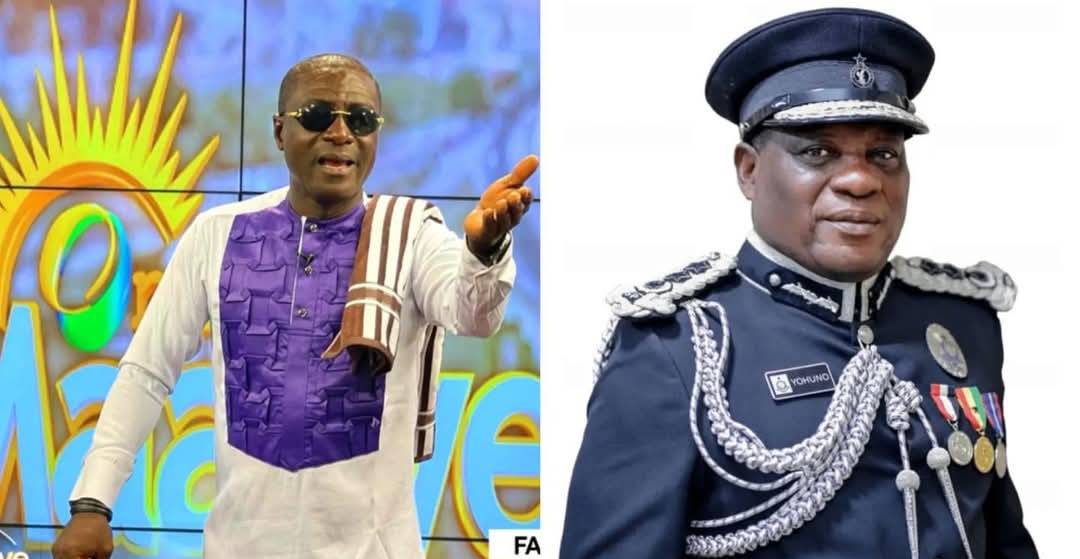The Deputy Inspector General of Police, Christian Tettey Yohunu, has taken legal action against well-known broadcaster Blessed Godsbrain Smart, popularly called Captain Smart, and his employers, Media General Limited. The case has captured public attention due to the nature of the claims and the individuals involved. Yohunu, through his lawyers, filed the lawsuit at the Accra High Court on January 2, 2025, citing defamatory remarks made by Captain Smart during a television broadcast.
According to the Deputy IGP, the statements aired on December 27, 2024, on Onua TV were not only false but also damaging to his hard-earned reputation. The remarks, he says, paint a picture of someone who is unprofessional, politically biased, and willing to compromise his integrity for personal gain. Yohunu insists these claims are baseless and have caused him significant harm, both personally and professionally.
The comments made by Captain Smart centered on allegations that Yohunu's appointment as the Deputy IGP was politically motivated. During the program, Smart reportedly claimed that Yohunu was affiliated with the ruling New Patriotic Party (NPP) and had attended secret meetings aimed at lobbying for his position. Furthermore, Smart alleged that Yohunu had visited the homes of some top members of the opposition National Democratic Congress (NDC) and offered them money in a bid to secure their support for his promotion to the position of Inspector General of Police (IGP).
These allegations, according to Yohunu, are entirely untrue. He argues that they were made with the sole purpose of tarnishing his image and casting doubts on his professionalism. As a high-ranking officer of the Ghana Police Service, Yohunu says his integrity is key to his work and that such accusations could undermine public trust in him and the police force as a whole.
In the court documents, Yohunu is asking for several remedies. First, he wants the court to order Captain Smart and Media General to retract the statements made against him. The retraction, he insists, should be done with the same prominence as the original broadcast. He is also demanding an unqualified apology to be published on Onua TV and aired on Onua FM at least three times.
Additionally, the Deputy IGP is seeking general damages for defamation. While the amount he is asking for has not been disclosed, such damages are typically awarded to compensate for harm caused to one’s reputation. Yohunu is also asking the court to place an injunction on Captain Smart and Media General to prevent them from making further defamatory statements about him.
This case has sparked conversations about the responsibilities of media personalities and broadcasters. In Ghana, as in many parts of the world, the media plays a significant role in informing and educating the public. However, with this power comes the responsibility to ensure that the information shared is accurate and fair. When media professionals fail to verify the claims they broadcast, the consequences can be severe, as demonstrated by this lawsuit.
Captain Smart is a well-known figure in Ghana's media landscape. He is admired by many for his boldness and outspokenness, often using his platform to hold public officials accountable. However, his critics argue that he sometimes crosses the line, making unsubstantiated claims that could harm individuals’ reputations. This is not the first time Captain Smart has faced criticism or legal action for his statements.
Media General Limited, the company that owns Onua TV and Onua FM, is also under scrutiny in this case. As the employer of Captain Smart, the company could be held liable for the remarks made on their platform. This serves as a reminder to media organizations about the importance of editorial oversight and ensuring that their content adheres to journalistic standards.
For Deputy IGP Yohunu, this lawsuit is not just about clearing his name but also about setting a precedent. In his view, public officials should not have to endure false accusations that could ruin their careers and reputations. By taking this matter to court, he hopes to send a strong message about the consequences of spreading false information.
This case highlights the need for accuracy and fairness in public discourse. In a democratic society, free speech is a fundamental right, but it comes with responsibilities. Making unverified claims, especially about public figures, can have serious legal and ethical implications. As this case unfolds, it will likely serve as a lesson for both media practitioners and the general public about the importance of truth and accountability.
The outcome of the case is yet to be determined, but it has already sparked widespread interest. Many are watching closely to see how the court will handle the matter and what it will mean for the future of media practices in Ghana. For now, the focus remains on the Accra High Court, where both sides will have the opportunity to present their arguments.
As the legal battle between Deputy IGP Yohunu, Captain Smart, and Media General unfolds, it serves as a powerful reminder about the value of reputation and the lengths people will go to protect it. Whether this case ends in a retraction, damages, or something else entirely, it has already underscored the need for caution and responsibility in the way we communicate, especially in the public domain.




No comments yet
Be the first to share your thoughts!